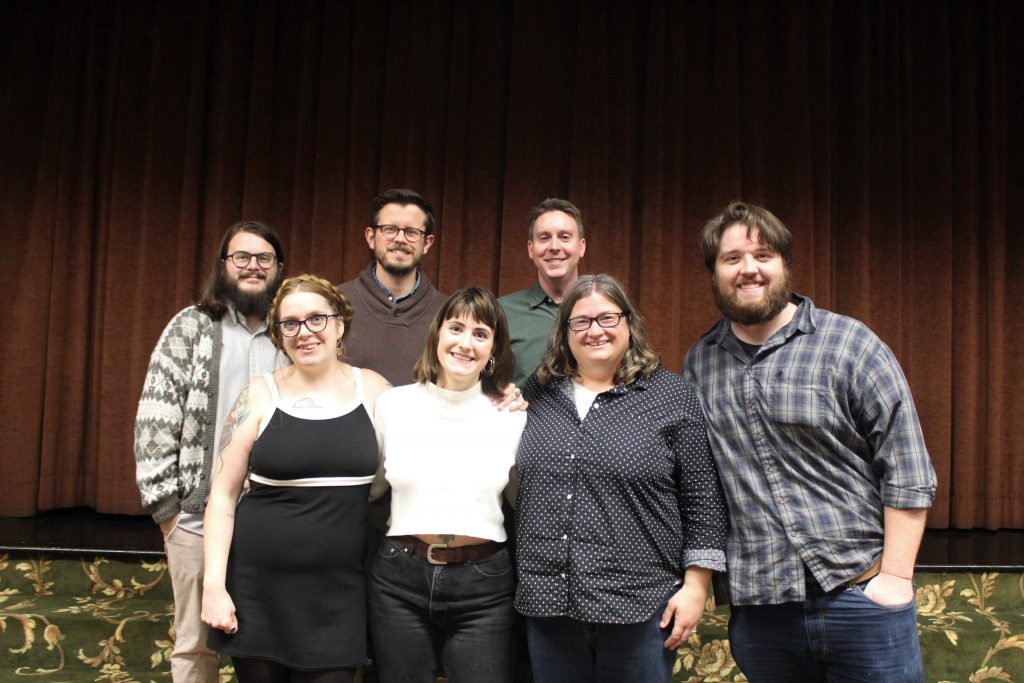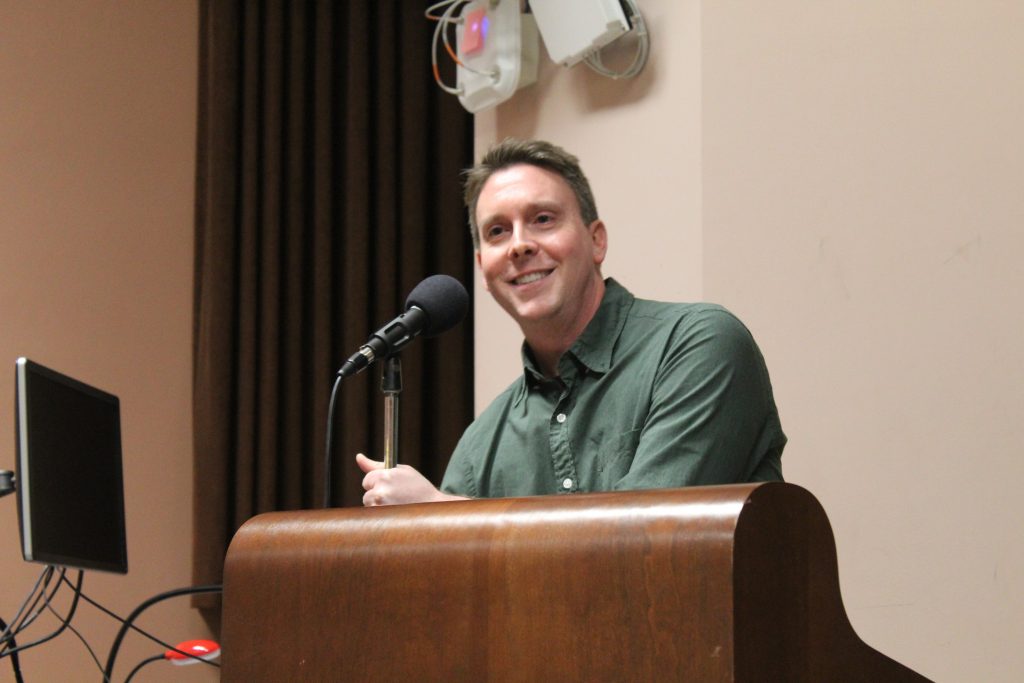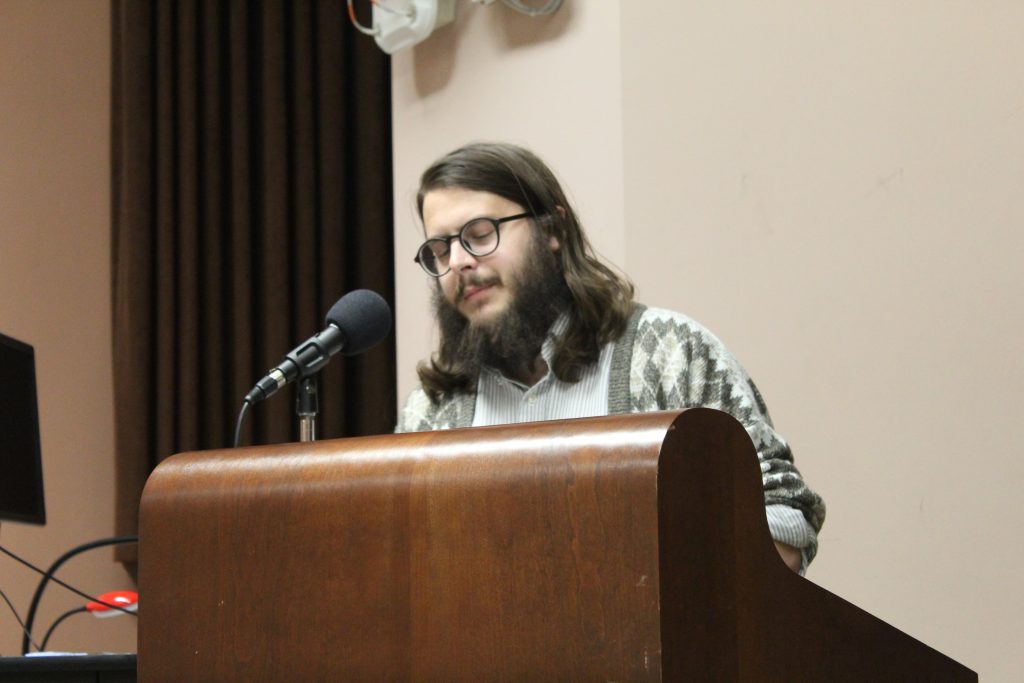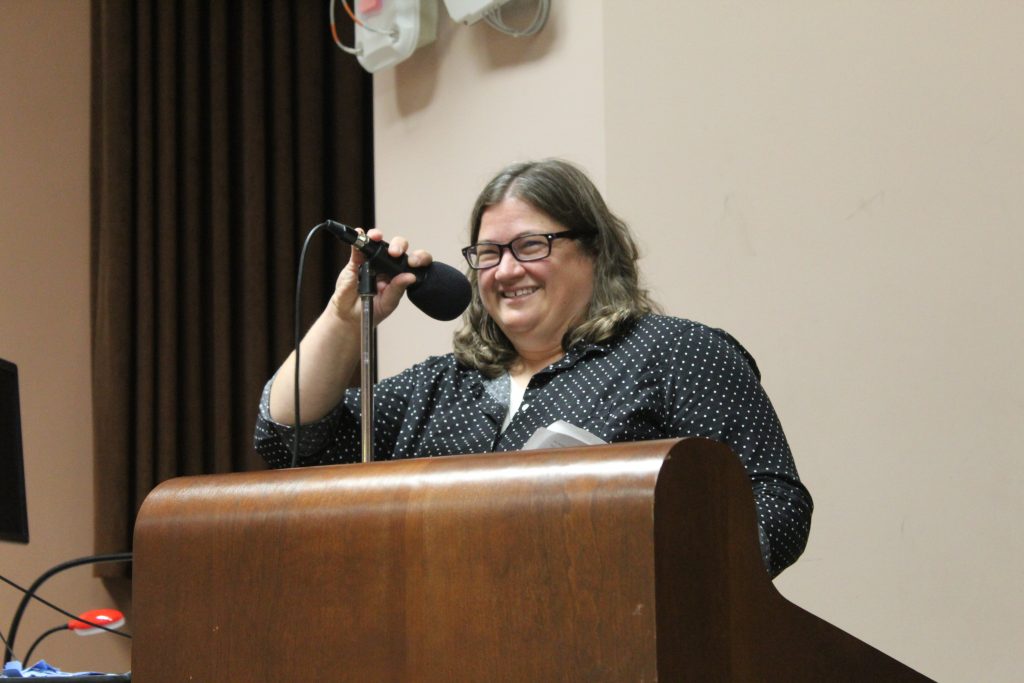
As the days begin to shorten and the air begins to chill, once again we welcome a return of the annual Writer’s Harvest! Here is a sneak peek at who will be reading this year and what they have in store for us:
Joe Squance — He/Him
Visiting Professor

Tell me a little about yourself/your writing/academic interests!
I have a Master’s degree, which I guess makes me Master Squance.
What are my academic interests? That’s a good question. I don’t consider myself to be a very good academic, but my interest is stories. I like stories. I like to read them and think about how they were written and what the author meant by them and how the author tried to convey that through words on a page. I like to talk about stories. I like to draw them. So my interests are short fiction and flash fiction, but really all fiction. I teach some poetry, but I consider myself a student of it.
My own writing lately has been mostly flash fiction, which is stories shorter than 1,000 words. My shortest story is 300 words on the nose. I’m a shy guy and tend not to say much around people I don’t know, and that’s kind of how I write. I like to see how little really truly needs to be said out loud.
My favorite part of the holidays is having the excuse to sit around and do nothing. Every day of my life is a battle against laziness that sometimes I win and sometimes I don’t and sometimes is a draw. But during the holidays there is no battle. Laziness and I sit down with our coffee, do the NYT daily crossword, and listen to records. It’s great.
Have you read at the Writer’s Harvest before? Also, do you have anything in mind as to what you will read this year?
I can’t remember if I’ve read before at Writer’s Harvest, but I think I have. I’ve been around long enough that it makes sense I’d have done it at least one other time. I have two stories picked out to read for this time around, both pieces of flash fiction. I like flash for live readings because I feel like they’re easier for listeners to keep track of — I know that when I am in an audience listening to a longer story, I can sometimes lose the thread. Two little flashes are ideal for the Writer’s Harvest, I think, considering how many readers are on the schedule. My little storylets should be easy for everyone to follow along with. And one of the stories I’ve picked for its content: it’s about a guy who ventures out into the night and attends a fiction reading at a small, Midwestern university. It should be very accessible material.
Trevor Root — He/Him
MFA Student

Tell me a little about yourself/your writing/academic interests!
I’m Trevor, I’m an MFA student here at Miami studying Creative Writing with a focus in Poetry. Before coming to Miami I earned my BA in English at Duquesne University in Pittsburgh. My academic interests are sort of all over the place. Right now I’m mainly interested in experimental poetics and its relation to/as autonomous political philosophy. I guess my favorite part of the fall would be the weather—I’m originally from Connecticut so I’ve always been a fan of the cold.
Have you read at the Writer’s Harvest before? Also, do you have anything in mind as to what you will read this year?
I haven’t, but I attended last year’s which was a great experience. I’m excited to try out some of my new work to a broad audience. Most of the readings I’ve done so far have been smaller events, so the audience has been fairly narrow.
I will most likely be reading from two new works, both experiments in using computer-assisted procedural techniques to ‘generate’ raw text from which I assemble poems. The first uses the phrase “the beverage you are about to enjoy” as an organizing subject to replace speaker pronouns (I/you/etc). The second plays with the inconsistencies of Google Translate to generate short poems from otherwise nonsensical blocks of text. In both, I’m particularly interested in working with sound, so I thought this would be a good chance to really see how they play in a reading experience.
What are your thoughts on Oxford’s writing community, and how we as creative writers can give back to that community?
I’ve been really impressed in my time here with how large and active the creative writing community is. Events like Writer’s Harvest help not only maintain but expand artistic communities, and I’m excited to be able to contribute.
As someone interested in autonomous politics, I think “being” a writer offers a ton of opportunity to engage with and contribute to one’s community/society. In one sense, writers work at the boundary between the real and the possible. But there is also a danger implicit to “being a writer,” which is falling for the trap of “removal”—pulling away from the realities of our communities or societies and staying in the bubble of reflection, observation, etc. It’s cheesy but I look to people like Pete Seeger as models of how a writer can give back: people who engage seriously with the realities and struggles of the world around them while always directing their art towards opening up or exploring new possibilities.
Katy Shay — She/Her
MA Program Alum

Tell me a little about yourself/your writing/academic interests!
My name is Katy Shay. I’m a nonfiction writer: narratives and essays but I also draw comics. I love the fall because it’s the best time to get cozy. I’m talking hot chocolate, pajamas, slippers, blankets—the whole nine yards.
Have you read at the Writer’s Harvest before? Also, do you have anything in mind as to what you will read this year?
I read at the Writer’s Harvest in November of 2016 which was a really fraught time to be on campus. After the election, I remember feeling really on edge while on campus and a lot of the people in my program, including myself, were super worried about what a Trump presidency would be like. I read some piece about this girl Tara who was a very tough girl who tried to befriend me when I as in seventh grade. The piece was about the tension I felt being stuck between this cool tough girl who also scared me and the girls who I grew up with who were goody-goodies. A few of my creative writing students attended and after the reading one came to my office hours.
We ended up talking for hours about basically everything. Family and philosophy and writing and music and travel and religion and politics. We were very different people, like in every way. But there was something about the timing. Something about that piece and the exact timing of everything—even that fraught feeling on campus—that made this young man feel like he could come talk to someone who he felt was super different from him and try to understand.
It’s a hard thing to put into words but that experience had a huge impact on me. It’s the promise of writing and sharing your writing—that it can lead to openings between people, places where we can see one another and value that.
What are your thoughts on the Writer’s Harvest?
The Writer’s Harvest is awesome. It’s a great time for the whole community to come together and celebrate what they have. I think it’s sometimes easy to undervalue our writing communities—especially in school because everything is so go, go, go. The Writer’s Harvest is a great time to pause and listen to appreciate the work that everybody’s doing.
What projects are you working on?/Anything you want to plug?
I don’t have any currently but if you want to plug my Instagram @shadykays that’s where I update/link to published stuff/make mushroom puns.
Jen Sammons —She/Her
Second-year MFA student

Tell me a little about yourself/your writing/academic interests!
I write mostly creative nonfiction but have been writing some flash fiction lately which has been really fun. I am thinking of reading two short pieces for the Writer’s Harvest and just might leave it up to the audience to determine whether or not the story is true!
What are your thoughts on the Writer’s Harvest?
Last year’s Writer’s Harvest had such a great vibe. Since this event comes at a point in the semester in which everyone still has a lot of work to do, but is also feeling pre-break excitement, Writer’s Harvest has this spirit of festive camaraderie. It feels good to step away from our desks, offices, classrooms, and computer screens, and come together.
It means a lot to me to be a part of events that help other people. I think that it is so important for people who work with words to use them for as much good as we can in as many ways that we can. I believe that writing is a powerful act of love, of resistance. Whether it’s by writing an op-ed, sharing resources, or speaking out against hate and injustice, we as writers have a responsibility to make sure that our words move off of the page and into the world.
What projects are you working on?/Anything you want to plug?
I am working on a couple of book projects that move across and through genres and forms, but most of my creative energy these days goes into helping my 8-year-old find matches for his socks. 🙂


